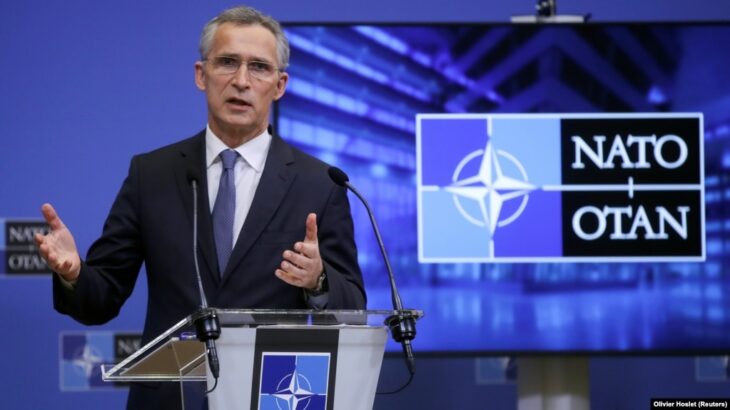
Western expressions of support for Ukraine are growing amid an uptick in violence and an increased Russian troop presence across the border that have heightened concerns of a widening conflict.
NATO Secretary-General Jens Stoltenberg said on April 6 that he had called Ukraine’s president “to express serious concern about Russia’s military activities in and around Ukraine & ongoing ceasefire violations.”
Ukrainian President Volodymyr Zelenskiy reportedly told Stoltenberg that a path toward NATO membership was the only way to end war in eastern Ukraine, where Russia-backed separatists continue to battle Ukrainian government forces seven years into the conflict.
Zelenskiy also urged NATO member states to strengthen their military presence in the Black Sea region as a “powerful deterrent” to Moscow.
Stoltenberg tweeted that “#NATO firmly supports #Ukraine’s sovereignty & territorial integrity. We remain committed to our close partnership.”
A spokesman for Russian President Vladimir Putin later misleadingly characterized the situation as a “domestic problem” and said Ukrainian membership in the transatlantic military alliance would make things worse.
Since occupying and annexing Crimea from Ukraine early in 2014, overwhelming evidence suggests Russia has continued to lend diplomatic and military aid to armed separatists fighting in eastern Ukraine, despite denials to the contrary.
“We very much doubt that this will help Ukraine settle its domestic problem,” Kremlin spokesman Dmitry Peskov said on April 6. “From our point of view, it will only worsen the situation.”
Earlier in the day, Russian Deputy Foreign Minister Sergei Ryabkov said high-level Russian and U.S. officials had discussed the situation in southeastern Ukraine. That TASS report has not yet been confirmed by U.S. officials.
The Russian report follows a demand a day earlier by the U.S. State Department that Moscow explain “provocations,” including military movements in the region.
On April 5, British Prime Minister Boris Johnson expressed “significant concerns” about the Russian buildup near Ukraine’s border. In a call with Zelenskiy on April 5, Johnson voiced “unwavering support” for Ukraine’s sovereignty and territorial integrity, Johnson’s office said.
U.S. President Joe Biden spoke with Zelenskiy on April 2 about the buildup in his first call with the Ukrainian leader since taking power in January.
Fighting between Ukrainian government forces and Russia-backed separatists in two eastern provinces has spiked in recent weeks despite a cease-fire agreement reached in the summer.
Officials in Kyiv reported on April 6 that two more Ukrainian servicemen had been killed by Russia-backed forces in the previous 24 hours. Four soldiers were killed by separatist shelling in late March.
Russia has acknowledged moving troops toward its border with Ukraine in what Moscow says is an exercise. The United States has called it an attempt to intimidate Ukraine.
“Russia’s recent actions pose a serious challenge to the security of Ukraine, NATO member states, and the whole of Europe,” Zelenskiy reportedly told Johnson during their conversation, adding a call for a stronger physical presence in the region.
He also urged Western nations to impose tougher sanctions on Russia for its destabilizing activities and invite Ukraine into NATO’s Membership Action Plan.
Russia is opposed to Ukraine joining the military alliance and recently warned NATO countries against sending troops to support Ukraine.
Ukraine has been battling the Russia-backed separatists in a low-simmering war since 2014, when unrest in Kyiv toppled Kremlin-friendly President Viktor Yanukovych.
More than 13,000 people have been killed in the ensuring seven years. Russia is demanding Ukraine give the separatist-controlled regions greater autonomy, which would effectively prevent the country from joining NATO.
Ukraine has blamed the Russia-backed separatists for the recent spike in hostilities, while Moscow has pointed the finger at Kyiv.
Some analysts have suggested that the recent actions may be Russia’s way of testing the new Biden administration’s commitment to Ukraine.



